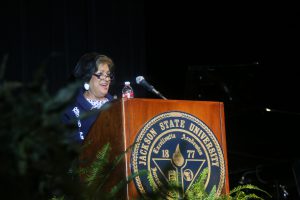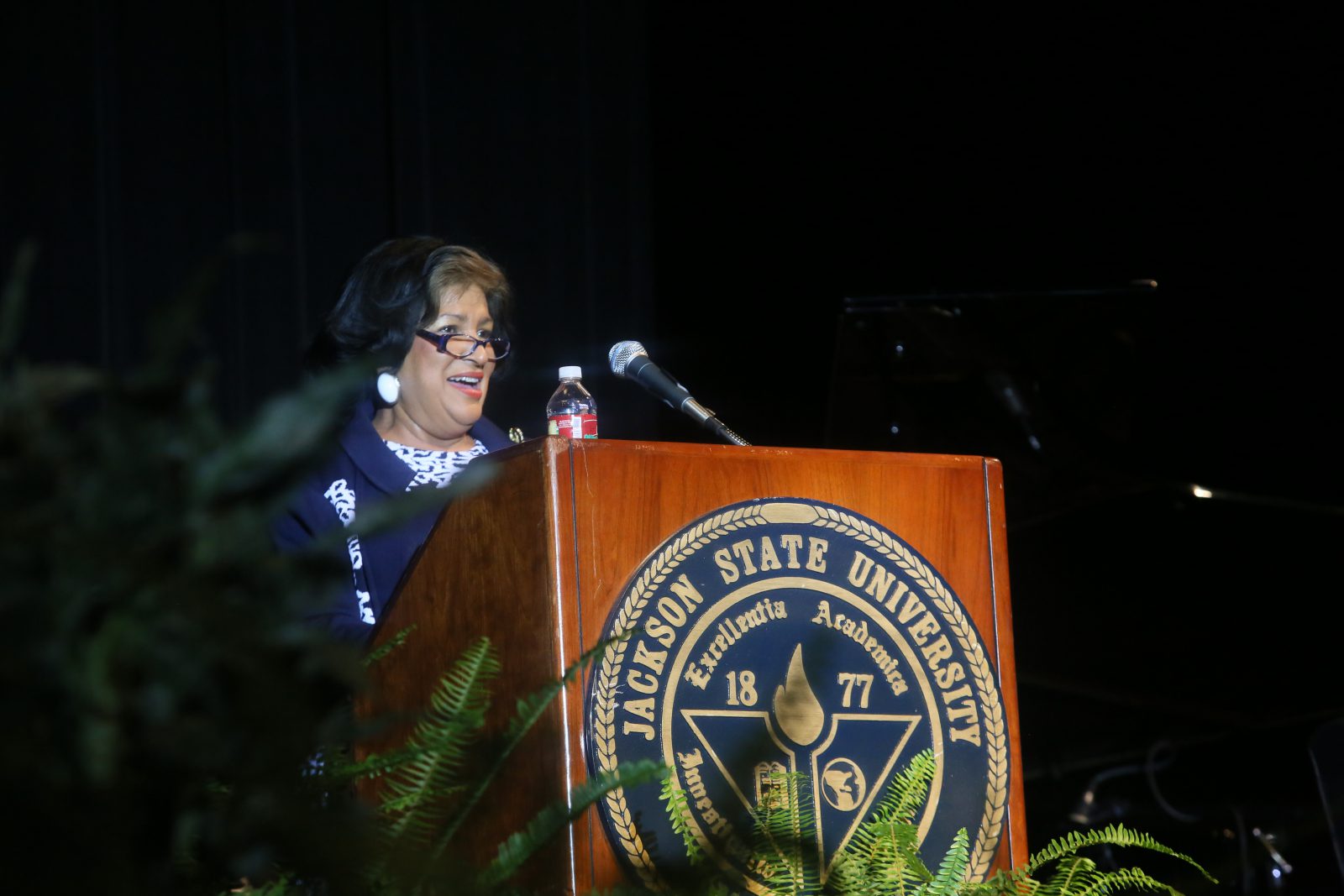 Plans to establish a Jackson State University School of Public Health, a project to create a “library of the future,” and the recent funding of two new Jackson Heart Study Centers were among the announcements JSU President Carolyn Meyers delivered Thursday to faculty and staff.
Plans to establish a Jackson State University School of Public Health, a project to create a “library of the future,” and the recent funding of two new Jackson Heart Study Centers were among the announcements JSU President Carolyn Meyers delivered Thursday to faculty and staff.
Meyers’ address during the 2013 Fall Faculty and Staff Seminar also applauded the work of the JSU community for securing about $36 million in sponsored research funding and using technology to advance student learning.
The university is entering its second year of the iPad initiative in which incoming freshmen receive a scholarship to receive the mobile device for use in curriculum.
“Our faculty are teaching with iBooks that they’ve authored, and our students are discovering the power and opportunities available through this technology,” Meyers said. “Our campus is engaging with technology in such innovative ways that we’ve added cyberlearning as a core function of Academic Affairs.”
The theme of the 2013 seminar is “One JSU: Higher Purpose, Higher Expectations, Higher Outcomes.” The two-day event that began Thursday features the introduction of new employees and the executive cabinet and numerous sessions on topics that include integrating campus services effectively, integrating technology into the curriculum and diversification of JSU resources.
Meyers told the audience that the university wants to establish an accredited School of Public Health. She said university officials were recently informed that the Jackson Heart Study centers had received funding from the National Institutes of Health.
“These centers align with JSU’s commitment to research and education on minority health disparities,” Meyers said. “They enhance the national imperative for a healthier citzenry, and their results represent an investment in the future health of people of color all over the globe.”
Meyers said work would start this fall on transforming the campus library into a model for the future. Physcial changes to the facility will create work spaces that foster innovation and creativity among students, staff and faculty, she said.
Jackson Mayor Chokwe Lumumba also gave remarks to the JSU community on Thursday, saying he considers Mississippi’s capital city a partner of the university.
He said challenges still exist 50 years after the fight for civil rights, and he exhorted the JSU community to continue to build a foundation to “aid students in intellect and preparation to go out and fight the barriers that remain.”
Meyers’ address was streamed at https://www.livestream.com/jsupresident
For a complete description of events and meeting locations during the second day of the event, click here.
Dr. Lawrence T. Potter, Jr., dean of the College of Liberal Arts, said the annual seminar allows faculty, staff and administrators “to recognize more deeply best practices to prepare ourselves and our students for the future.”
“Because a university should be a place where imagination and creative ideas flourish, this year’s theme invites us to reconsider the higher education landscape in an era of increased external public scrutiny and criticism,” said Potter.
The keynote address on Friday, Aug. 16, will be given by Charlie Nelms of Destination Graduation Initiative, which is an effort to transform historically black colleges and universities. Nelms will speak during the opening session, which starts at 8:30 a.m.
Nelms, the keynote speaker, has more than 40 years of experience and leadership in higher education. He most recently served as chancellor of North Carolina Central University in Durham, N.C., from 2007 to 2012. His accomplishments included raising the standards for undergraduate admissions and progression and guiding the establishment of the first and only Ph.D. program to be offered at NCCU in 50 years. Under his leadership, U.S. News & World Report ranked NCCU s one of the best public HBCUs in the country for three consecutive years.
In 2011, Nelms published, “A Call to Action,” a policy directive intended to spur a national dialogue concerning the revitalization of the historically black colleges and universities as an important sector of American higher education.








Leave a Reply